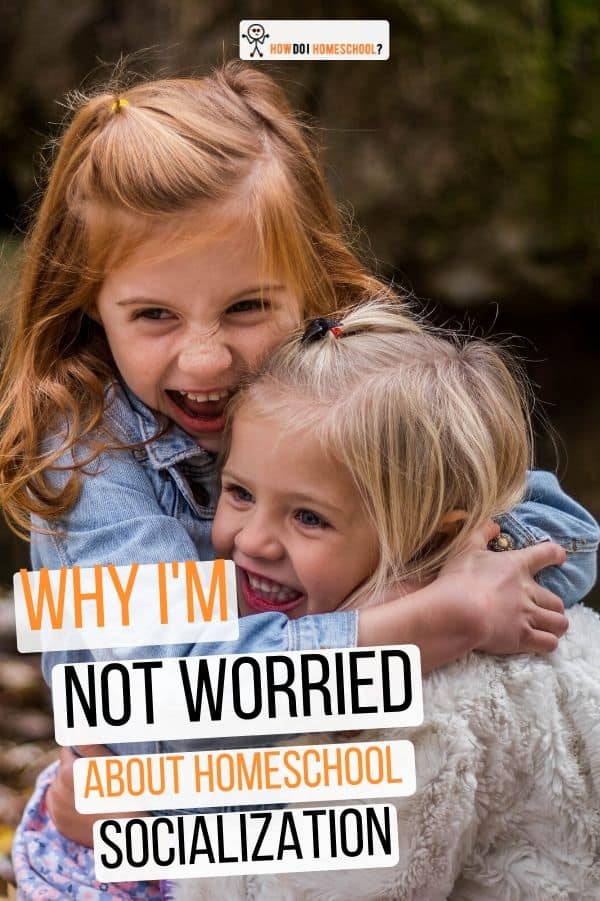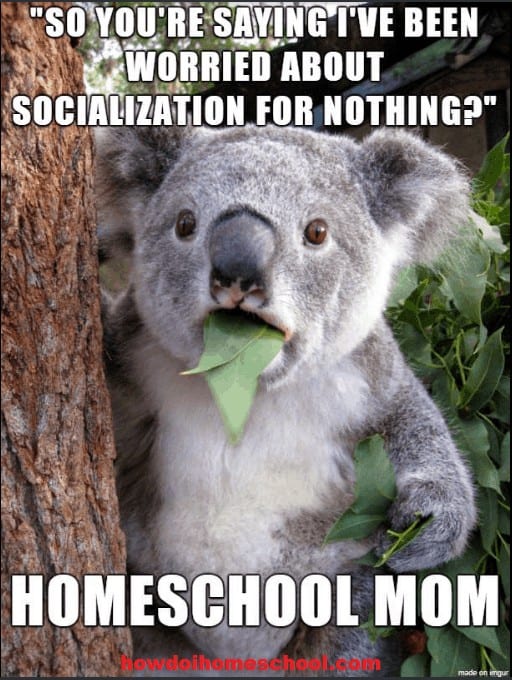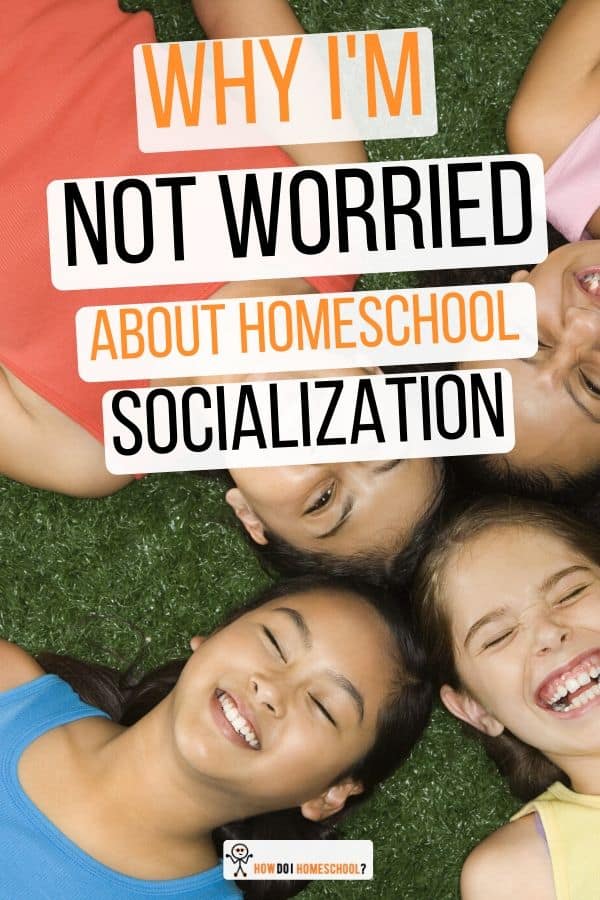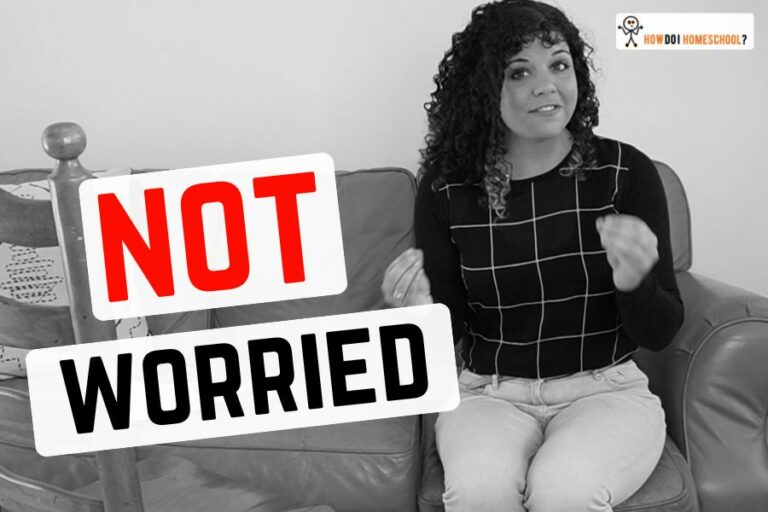In the realm of homeschooling, a notorious question haunts potential home educators like a pesky mosquito: “Oh, but what about socialization? Won’t your kids be doomed to social ineptitude if they dare to skip the conventional schooling experience?” Alas, our society, wrapped in its conventional cocoon, deems interaction with peers as the sole sacred path to acquiring respectable social skills, blatantly disregarding the crucial role of parents. But let me pose a thought-provoking inquiry: Could it be that this notion is nothing more than a fanciful fabrication, a whimsical tale spun by societal norms? Let’s venture forth into the depths of this matter, shall we?

I hope you enjoy reading this blog post. If you want to do my course on how to homeschool, click here.
Greetings, esteemed readers! Prepare to embark on an enchanting journey into the realm of homeschooling and its intriguing relationship with socialization. In this concise yet captivating article, we shall delve into the following delightful topics:
- Unraveling the web of socialization arguments and dispelling the fantastical myths surrounding them.
- Discovering the profound importance of socialization in the marvelous tapestry of child development.
- Unveiling the eternal conundrum: Do peers reign supreme as the ultimate purveyors of social skills, or might our intrepid parents possess a secret key to this coveted domain?
- Exploring the fascinating nooks and crannies where homeschoolers, like unconventional social butterflies, gracefully find their own spaces for growth.
So tighten your intellectual seatbelts and get ready to be enlightened, for we are about to embark on a delightful journey through the realms of homeschool socialization.
The Arguments and Homeschooling Myths
Picture this: “We absolutely must have our precious offspring learning social skills from their peers at the tender age of three, or else they shall be doomed to social failure in their adult lives!” cries the well-meaning masses.
But hold on a moment!
Enter Children’s Campus, the sage of early socialization, with this proclamation:
Social development is intertwined with every aspect of your baby’s growth. Start socializing them with other little ones from a young age to cultivate their sense of self and teach them societal expectations. Preschool or childcare centers are the holy grail of social interaction and developmental milestones!
Nonsense, I say!
These notions lack solid evidence.
It seems we’re fixated on the magnificence of school-based socialization while conveniently overlooking the power of nurturing socialization at home with our dear parents.
Of course, there are consequences when kids miss out on socializing—cue the dreaded BO sniff or the awkward blank stare at socially inappropriate moments.
But let us not forget the darker underbelly of peer groups, where they serve as teachers of far more perilous lessons.
Think drug and alcohol use, premature romantic escapades, and a host of other unsavory disadvantages.
So, my astute readers, let us challenge these preconceived notions, debunk the myths, and explore the multifaceted world of homeschooling and socialization with a splash of wit and wisdom. Are you ready?
Let’s dive in and shatter these misconceptions one quip at a time!

What is the Importance of Socialization in Child Development
Of course, socialization is incredibly important for child development. If you don’t get it, you could get:
- depressed and have less empathy
- lose your sense of reality (think of solitary confinement) and
- a decreased ability to learn
As a child, lack of socialization causes brain changes. Life Science said this:
They found that early institutionalization changed both the structure and the function of the brain. Any time spent in an institution shrunk the volume of gray matter, or brain cell bodies, in the brain. Kids who stayed in the orphanages instead of going to foster care also had less white matter, or the fat-covered tracts between brain cell bodies, than kids who, at a young age, moved in with families…children of nurturing mothers had hippocampus volumes 10 percent larger than children whose mothers were not as nurturing.
So, socialization is definitely important for child development – but who says socialization only goes on in a school or preschool? We should be asking the question, ‘Is school taking away the time we might spend socializing with our own children?’

Myth: ‘Socialization Only Happens in School’
Ah, the notorious fallacy that socialization exclusively unfolds within the hallowed halls of daycare or traditional schooling.
How delightfully untrue!
It is a wicked lie that engenders heartache and guilt among the loving, stay-at-home moms who yearn to homeschool or delay their little ones’ school journey.
The boldness of this untruth is quite remarkable! Its harmful influence is widespread and has led to painful ruptures in parental bonds, inflicting wounds upon both child and caregiver.
Emotional development, the delicate dance of growth, suffers at the hands of this misguided belief.
But wait, there’s more!
Enter the misconceptions surrounding resilience, those tantalizing tales that proclaim school as the sole catalyst for a child’s fortitude.
Alas, this too is but a falsehood wrapped in misguided notions.
Resilience, dear friends, entails more than mere endurance.
It beckons the child to grow stronger, to rise from adversity with grace and swiftness.
Yet, alas, many children simply carry scars, remnants of premature separation from their parents.
Their emotional wounds, though unseen, silently persist as they trudge forward.
So, let’s shed the cloak of deception that enshrouds these narratives, for they rob us of truth and shroud us in unnecessary pain.
Let’s embrace a broader understanding of socialization, one that acknowledges the power of loving homes and individualized journeys.
May we foster bonds, nurture emotional growth, and create resilient beings who emerge not merely scarred but triumphant.
Together, let us challenge the fabrications and weave a tapestry of truth, understanding, and compassion for the sake of our children’s well-being.

Where Homeschoolers are Socialized
- Parents: The benevolent maestros of their children’s social development, fostering bonds and nurturing social skills within the cozy confines of home.
- Relatives: The extended family, a mosaic of connections and shared experiences, offering a unique blend of camaraderie and support.
- Church: A spiritual haven where homeschoolers find fellowship, forming bonds rooted in faith and shared beliefs.
- Neighbors: The friendly denizens of the neighborhood, creating a sense of community and providing opportunities for casual encounters and neighborly banter.
- Community: A vibrant tapestry of local organizations, clubs, and events that beckon homeschoolers to partake in shared passions and communal pursuits.
- Sports teams: The arenas of athletic prowess, where homeschoolers engage in friendly competition, teamwork, and the joy of physical activity.
- Art, dance, writing, and music lessons: The realms of creativity and self-expression, where homeschoolers explore their passions, connect with like-minded peers, and hone their skills under the guidance of talented instructors.
Oh, but wait, there’s more!
Homeschoolers are not content to merely dabble in a single realm of socialization.
No, they engage in a multitude of activities each week, adorning their social development with an array of experiences.
With every interaction, they learn the art of appropriate behavior, honing their social skills, and adapting to the ever-changing symphony of society.
Subscribe to How to Homeschool (my Youtube channel!)
Have you caught the homeschooling bug? Eager to delve deeper into the realm of unconventional education?
Well, my curious comrades, rejoice!
There are splendid avenues awaiting your exploration.
Firstly, hop on over to my YouTube channel, where a treasure trove of homeschooling wisdom awaits. From practical tips to delightful anecdotes, I unravel the mysteries of homeschooling with a touch of wit and wisdom.
Subscribe, hit that notification bell, and embark on an enlightening journey with me.
Enroll in the Homeschool Parenting Program
For those wanting a comprehensive guide to homeschooling, look no further than my Homeschool Parenting Program.
This online course will equip you with the knowledge, strategies, and confidence to navigate the exhilarating world of homeschooling like a seasoned pro.
Enroll today and unlock the door to extraordinary educational possibilities.
Conclusion
So, dear homeschooling moms, heed this advice: Do not succumb to the bamboozlement of those who insinuate that your precious little ones are devoid of socialization due to homeschooling. Nay, for you are the architects of their social growth, embracing the vast tapestry of human interaction beyond the confines of traditional schooling.
Let us break free from the shackles of narrow-minded thinking and celebrate the multifaceted avenues of socialization. Family bonds, community connections, and the nurturing embrace of churches and community groups hold immeasurable value in shaping our children’s social beings.
Remember, dear friends, that socialization knows no bounds. It transcends the walls of institutions and finds solace in the rich tapestry of life itself. Embrace it, cherish it, and let it guide the steps of your remarkable homeschooling journey.




I definitely agree with the post! I have a four-year-old who is in pre-K and I’m starting to sense that God is putting it on my heart to homeschool her long term. Before I put her in school, she had no trouble socializing with other kids. She played at the local park, at church events, and with my neighbor’s daughter. She gets tantrums occasionally, but this is normal and with loving discipline, she’ll be okay. My family contends that she is shy because she needs to be around other kids at school and that there is too much togetherness between my daughter and I. This saddens me and I noticed how my daughter’s mood is when I pick her up at school. I don’t see the excitement on her face, even though she talks about how she likes school. But in my heart I know something isn’t quite right about her time there. She has had accidents there on a regular basis. I believe that our society is trying to separate young children from their parents at earlier ages and it’s not necessary in my opinion.
Thanks for your comment Thea.
My parents had the same struggle. They noticed we were really sunny, happy little kids before we went to school. Then, they said, we changed dramatically. No longer were we happy and content, but we were on edge and quite nervous. (I started behaving really badly, including stealing things from the local supermarket when I was five…I stole Barbie dolls because I was desperate to fit in with my peers who seemed so cool with their dolls).
When they began homeschooling us, they said this all changed and we became happy and content again.
My brother was always quieter at school, but he came out of his shell more when he was homeschooled. I think the ‘shy thing’ is often a result of personality more than the educational methods used. If you’re naturally shy, school or homeschool won’t bring about a change necessarily.
My friend also used to vomit constantly at school as she was so nervous. All this stopped when she was homeschooled. I’ll link her interview here. It talks about a few things you mention in your comment. https://www.youtube.com/watch?v=hOMstQCObsE&t=78s (sorry it’s in five parts!!!)